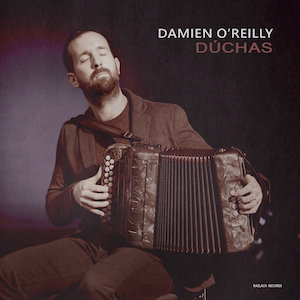 Damien O’Reilly –Dúchas
Damien O’Reilly –Dúchas
Raelach Records – Out Now
Damien O’Reilly hails from Corofin, Co. Clare, and his chosen instrument is the B/C chromatic 2-row button accordion. Damien’s played the box since the age of nine, and growing up, was heavily influenced by the North Clare tradition, which is still reflected in his current playing style. He’s also avidly collected and absorbed recordings of traditional music for as long as he can remember, and cites the likes of P.J. Conlon, John J. Kimmel, Michael Coleman, Paddy Killoran and The Flanagan Brothers as providing him with some particularly compelling source recordings. Fiddle music has also had a considerable effect on his own playing.
Damien was taught by Ennis-born accordionist Conor McCarthy, who has proved a major influence on his style; at the same time, he’s also learnt much from his own brother Padraic, a well-respected pianist who released his second solo album Highly Strung! 12 years ago and who accompanies Damien on eight of Dúchas’s 13 tracks. Damien’s other featured guest accompanists – generally in tandem with Padraic in an either/or capacity – are John Blake (guitar) and Caoimhín Ó Fearghail (bouzouki), and all three musicians are an ideal foil for Damien’s own infectious virtuosity, always genially present but never dominating or overreaching.
The disc is well-named, for the word Dúchas can signify heritage and homeland, affinity and instinct; there’s a very strong sense of both meanings (and shades thereof) in Damien’s playing. And furthermore, the choice of music we hear on Dúchas pays homage to the music Damien’s been immersed in throughout his musical life in Corofin and its environs. It’s especially reflected too in the lively and energetic qualities of his own playing – and no doubt his experience of playing for his parents, both keen set dancers, further reinforces these key qualities, as does the many years spent in the ranks of the Kilfenora Céilí Band. Indeed, I’d say that the first thing you notice is the sheer exuberance and rhythmic confidence of Damien’s playing. (Well perhaps the former trait can very occasionally come across as a touch flowery due to its tendency to openly embellish the melody line, although I admit I find that a key part of the charm and appeal of Damien’s playing).
As well as his trusty B/C accordion, Damien also plays melodeon on the disc – albeit only on two tracks (which is a shame, since these are among the disc highlights and the instrument’s attack may seem clearer in direct comparison). And there’s a further interesting timbral change when Damien picks up a B-flat accordion for the delicious set of flings at track 5, which give especial pleasure.
The album’s menu presents a really good variety of types and forms of tune, from archetypal Clare reels (naturally!) through to jigs, barndances, set dances, flings, and even a pair of marches (on which it’s possible to discern the strong inspiration Damien’s gained from the playing of Tony MacMahon). There’s also one solitary air (An Ciarraíoch Mallaithe), played as a solo; Damien learned this piece from the singing of Seamus Begley, and it’s very beautifully played here, of that there’s no doubt. It’s great too that Damien’s convivial booklet notes credit his sources, whether or not the tunes be familiar (or commonly played around west Clare) – after all, not every listener will have had the privilege of sitting in on a session with these fine musicians. Additionally, while the listener will always remain mindful of Damien’s own startling box-expertise, his interaction with his fellow-musicians is exemplary, with ample room to breathe in the gentle craic that naturally flows between them.
This is an unpretentious disc affording simple, tasteful pleasures which stand repeated listening, up close to savour – but the simplicity and apparent effortless ease of Damien’s playing is highly deceptive and inevitably there’s more to his artistry that’s revealed primarily by further attentive listening.

